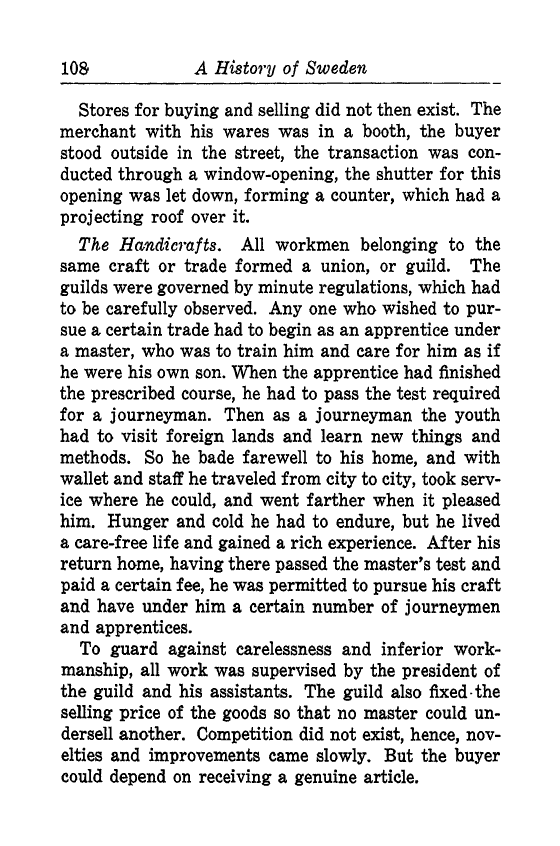
Full resolution (TIFF) - On this page / på denna sida - VI. Period of the Union, 1389–1531 - G. Life in the Cities

<< prev. page << föreg. sida << >> nästa sida >> next page >>
Below is the raw OCR text
from the above scanned image.
Do you see an error? Proofread the page now!
Här nedan syns maskintolkade texten från faksimilbilden ovan.
Ser du något fel? Korrekturläs sidan nu!
This page has never been proofread. / Denna sida har aldrig korrekturlästs.
108- A History of Sweden
Stores for buying and selling did not then exist. The
merchant with his wares was in a booth, the buyer
stood outside in the street, the transaction was con-
ducted through a window-opening, the shutter for this
opening was let down, forming a counter, which had a
projecting roof over it.
The Handicrafts. All workmen belonging to the
same craft or trade formed a union, or guild. The
guilds were governed by minute regulations, which had
to be carefully observed. Any one who wished to pur-
sue a certain trade had to begin as an apprentice under
a master, who was to train him and care for him as if
he were his own son. When the apprentice had finished
the prescribed course, he had to pass the test required
for a journeyman. Then as a journeyman the youth
had to visit foreign lands and learn new things and
methods. So he bade farewell to his home, and with
wallet and staff he traveled from city to city, took serv-
ice where he could, and went farther when it pleased
him. Hunger and cold he had to endure, but he lived
a care-free life and gained a rich experience. After his
return home, having there passed the master’s test and
paid a certain fee, he was permitted to pursue his craft
and have under him a certain number of journeymen
and apprentices.
To guard against carelessness and inferior work-
manship, all work was supervised by the president of
the guild and his assistants. The guild also fixed -the
selling price of the goods so that no master could un-
dersell another. Competition did not exist, hence, nov-
elties and improvements came slowly. But the buyer
could depend on receiving a genuine article.
<< prev. page << föreg. sida << >> nästa sida >> next page >>